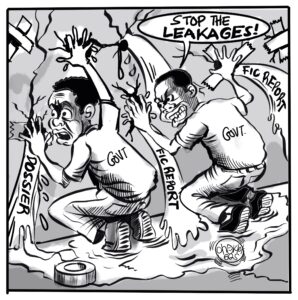The Civil Society for Poverty Reduction (CSPR) says illicit financial flows are rampant in Zambia due to lack of consistency in government policies aimed at combating the scourge.
Speaking when he featured on an OSISA funded ‘PA Bwingi Project on ending illicit financial flows’ UNZA Radio program, Wednesday, CSPR executive director Patrick Nshindano said there was need for efficient political will locally and internationally in order to curb illicit financial flows.
“What the problem has been in terms of curbing illicit financial flows is partly because of inconsistency on the part of us as a country and specifically government. I think when you realize that there is a problem like we did with the mining sector where we are saying ok this is how we are going to tackle this issue of illicit financial flows then because of the backlash, we backtrack then a few months later again you bring in another tax and so on, so that level of policy inconsistency on the part of government does affect issues to do with tackling issues to do with illicit financial flows,” Nshindano said.
“But it is also a very complex issue that needs a lot of political will beyond borders of a country like Zambia. You need to have a lot of corporative corporations of tax authorities out there because money is taken out of the country so you need systems that are able to first and foremost crawl back moneys that seem to be either of illicit flows but also in certain instances illicit flows can actually be proceeds of criminal activities and this is also a dangerous part which could also be a threat to national security.”
Nshindano said lack of strong investigative wings to track the illicit flow of finances had also contributed their persistence.
“We are a fully liberalized country both economically and financially so what that means is that people are free to move money in and out but also our systems have not grown, they are not strong enough to be able to detect some of these issues with regards to financial flows and that’s why if you are going to tackle issues to do with illicit financial flows there has to be very strong government to government corporation because it is not an issue that can tackled within the jurisdiction of Zambia alone because it is a very complex issue and a lot of money does get out of this country, and the onus is on us to be able to ensure through the revenue authority and different wings of government such as DEC, ACC work hard to end the scourge,” Nshindano said.
He noted that money that was acquired through illicit means was mostly externalized and kept in official accounts, thereby denying local people an opportunity to borrow money from local banks at cheaper rates as there was no excess money in local banks.
“If somebody regardless of the transaction that they do, decides instead of keeping money with ZANACO, they move money dubiously out of the country and go and put it in Bahamas or the Virgin islands, known to be a tax haven, what that does is that it’s robbing the country of the much needed capital which if it sits in a bank like ZANACO you have liquidity. But what you have is that there is no liquidity, money is being taken out of the country which pushes up interest because there is no money that even the banks don’t have excess to be able to bother about the small business people but worry about the bigger ones because they know first and foremost that there is security and they will be able to get a higher return. But also for a country like Zambia where you have a high presence of government participation in the financial market through issuance of bonds and securities, the banks prefer to deal with government because it’s a guarantee the risk there is very minimal and so the local economy tends to die out,” Nshindano explained.
He added that illicit financial flows had led to loss of revenue by government through tax avoidance by multi-national corporations.
“The bottom line is that illicit financial flows leads to a loss of resources on the part of the government, and the resources are actually lost into foreign hands, through taxation. If you look at the records of the mining companies, I stand to be corrected now, but based on the past records none of the mining companies in Zambia have actually paid corporate income tax. Most of them end up just paying mineral royalty which is basically a rent and they all indicate that no either loss making positions and all these things and the question has always been if you have been loss making for the past ten years why are you still here and those are the questions that are there and to be able to tackle that, one of the things government tried to do was come up with a single tear tax system where they say it doesn’t matter what you do, your profit base or whatever challenges or how you can do your calculations, what we want is basically a rent on the mining and what we are going to do is make it fixed and charge it on that but there was a lot of backlash to that effect because the fixed mineral royalty did not take into consideration the cost burden and operational cost of a mining company,” Nshindano said.
“So based on existing tax system you find that one may decide to manipulate their account and just declare the one that is giving them the lowest kind of tax burden so instead of operating at the 35 corporate income tax despite their earnings coming from that kind of amount they decide oh ok am going to pick the lower one which is an incentivized one, mainly because just a quarter of the activities is coming from that, take an example of agriculture because agriculture now is taxed at 10% so you find an entity that has a component of agriculture instead of paying the full corporate of 35, they decide to say our activities are under agriculture meanwhile that is not the case so you find that the country tends to lose a lot of resources.”
Nshindano said illicit financial flows had contributed to none delivery of social services and improvement of peoples’ living standards.
“Our call as civil society has always been can we ensure that we tackle the issue of illicit financial flows because even the debt burden that we are now suffering from is just as a result of that because as a country we are growing, the needs are growing every single day and government needs to ensure that it provides these services and can only do that through taxation but you only have a very few pool of people that are contributing to the coffers of the country most of the burden is placed on the agriculture sector,” said Nshindano.
























